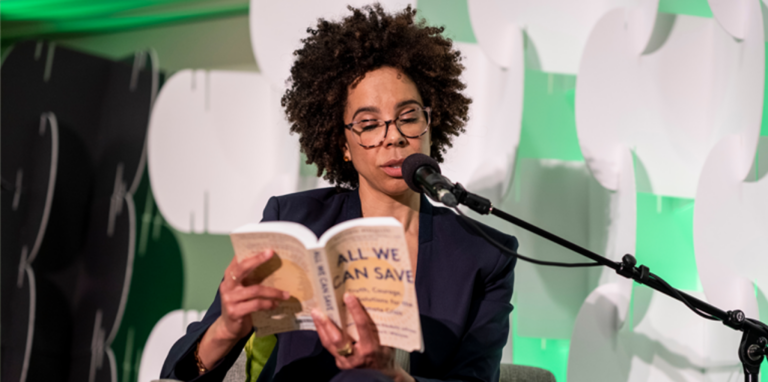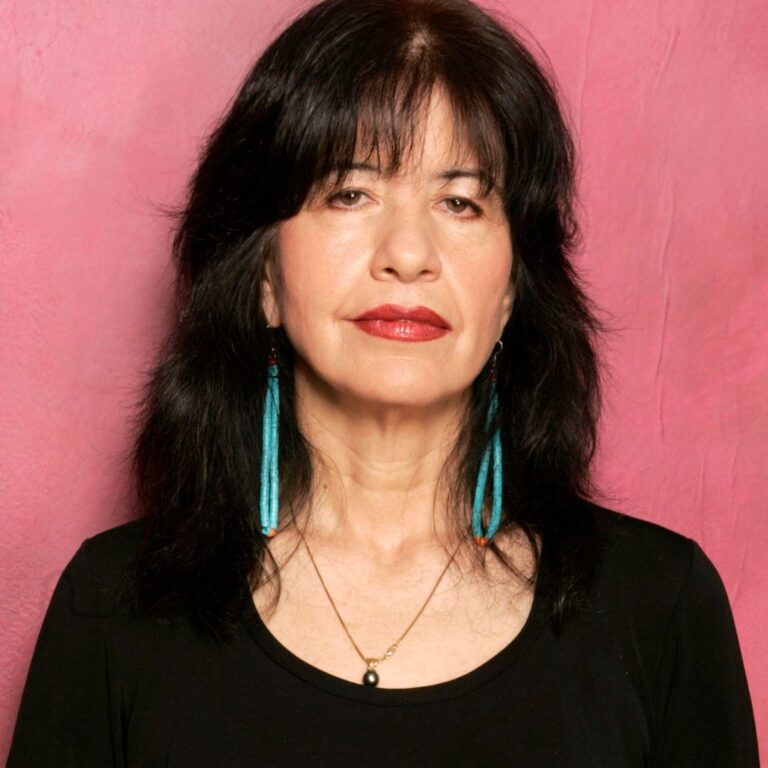What If We Get This Right?
Ayana Elizabeth Johnson with Krista Tippett
An excerpt from the in-depth On Being conversation between Ayana and Krista.
Ayana Elizabeth Johnson is a marine biologist, and co-founder of the Urban Ocean Lab, a think tank for coastal cities. She’s one of the creators of the podcast, How to Save a Planet, and she co-edited the wonderful anthology All We Can Save: Truth, Courage, and Solutions for the Climate Crisis. She’s also the co-founder of the All We Can Save Project.
Find the full show “Ayana Elizabeth Johnson — What If We Get This Right?” at onbeing.org.

Transcript
Krista Tippett: I thought it was interesting that you said, on the podcast you did with Alex Blumberg for Gimlet, that you like to ask guests to describe what the future would look like if we get things right on climate. And you said that very few responses made the cut.
Ayana Elizabeth Johnson: Yeah, because we don’t talk about it enough. So people somehow are not prepared for that question with a level of detail that makes it interesting to talk about on a podcast.
Tippett: I know, but what that also means that we’re not even putting our imagination towards it. This needs creativity, too.
Johnson: Oh yeah, absolutely. I mean, that’s something that Naomi Klein talks about a lot, is how we are sort of in this moment where imagination is one of the most valuable things we can bring to the table. And a failure of imagination means a failure of the spectrum of futures that are available to us. And I just, I like to think of — so I remind myself and others that there is still such a wide spectrum of possible futures, and we do get some choice in which ones we have. We’re not going to be able to take some sort of time machine backwards to a perfectly pristine planet, when there’s 8 billion or something people on the planet. But we can have any number of possible options. And so, while I’m not a fan of hope as a guiding principle, because it by definition assumes that the outcome will be good, which I know is not a given, I am completely enamored with the amount of possibility that’s available to us. So that’s the word that I try to embrace when I think about what if we get it right, is how much possibility remains.
Tippett: Something that I think about a lot is —
Johnson: I guess I have to finish writing this book now. [laughs]
Tippett: Yeah, you’re absolutely — you have to be committed to it. We’re all waiting.
Johnson: I will say that I think the thing that I’m excited about, about this book, is that it will include interviews with people who have a strong vision for the future, and it involves a lot of — it involves exciting and deep collaborations with a bunch of artists who are helping me, and hopefully others, to see that, because I feel like as much as we talk about arts and sciences and everybody collaborating, it doesn’t really happen as much as we want it to. But there’s a lot of different art we could be making to help people see their way into the future.
Tippett: And there’s a lot of poetry in the book …
Johnson: Ooh, yes.
Tippett: … which I said to you I’ve been — one thing I’ve been craving these last weeks is just a little bit of poetry, here. I think a lot about what I call the generative narrative, the generative landscape of our time, which I know, as a person in media, is just not covered as well, is not investigated with as much sophistication as we have to investigate everything that’s failing and catastrophic. And I wonder if — I feel like in your work — like in this book, you introduce us to Eunice Newton Foote. There’s a whole lineage that you are in — names we don’t remember, people who’ve contributed. And I wonder, also, just —
Johnson: It was Dr. Katharine Wilkinson, coeditor of All We Can Save, who introduced me to Eunice. I feel like I’m on a first-name basis with her, even though she was doing her research in 1856, when she discovered that carbon dioxide was a greenhouse gas and would warm the planet. A woman discovered this through experimentation in her backyard and was essentially erased from history. An Irish physicist a few years later came to a very similar discovery and was credited as “the father of climate science.”
Tippett: Someone with a Y chromosome.
Johnson: And Eunice also signed the Seneca Falls Convention.
Tippett: Oh, really?
Johnson: So she was, as Katharine and I like to say, the first climate feminist — although she didn’t really see this whole apocalypse coming, per se. [laughs] She was just like, This turns out it will warm the atmosphere, if we emit all of this carbon dioxide.
Tippett: So there’s also somebody you mention, who I learned about through you — Ayisha Siddiqa — and this incredible poem, which I guess told you I’d like for you to read to us, and then we’ll open it up for questions. But just say — so to me, also, again, just the story of who this person is fills out the story that we don’t know.
Johnson: So this young woman, Ayisha, I met at the big youth climate march in New York City. I guess it must’ve been September 2019, perhaps — hundreds of thousands of people in the streets of New York, millions of people around the world. And she was one of a dozen or so young people who was leading that particular march. And I was just absolutely in awe of them. And so I came across this poem that she posted on Instagram, and just, it knocked my socks off.
Tippett: Yeah, that she wrote.
Johnson: Even just the title, which is: “On Another Panel About Climate, They Ask Me to Sell the Future and All I’ve Got Is a Love Poem.”
“What if the future is soft and revolution is so kind that there is no end to us in sight.
Whole cities breathe and bad luck is bested by a promise to the leaves.
To withstand your own end is difficult.
The future frolics about, promised to no one, as is her right.
Rage against injustice makes the voice grow harsher yet.
If the future leaves without us, the silence that will follow will be an unspeakable nothing.
What if we convince her to stay?
How rare and beautiful it is that we exist.
What if we stun existence one more time?
When I wake up, get out of bed, my seven year old cousin
with her ruptured belly tags along.
Then follows my grandmother, aunts, my other cousins
and the violent shape of their drinking water.
The earth remembers everything,
our bodies are the color of the earth and we
are nobodies.
Been born from so many apocalypses, what’s one more?
Love is still the only revenge. It grows each time the earth is set on fire.
But for what it’s worth, I’d do this again.
Gamble on humanity one hundred times over
Commit to life unto life, as the trees fall and take us with them.
I’d follow love into extinction.”
I mean, kids these days. [laughs]
Tippett: [laughs] It’s true. It’s true.
Johnson: Gets me every time.
But this idea that we can be motivated by love, I think it’s just — it’s just the more delightful way to approach something that is the work of our lifetimes: to do it, thinking about not just the love of other species, but the love of other humans, the love of ecosystems, the love of places. I mean, we all have places that we’re deeply attached to, and many of them are changing for the worse. And so this potential to have that be our driving force is, to me, why I focus on solutions instead of raging against the machine. I mean, believe me, we need to stop with the oil and gas pipelines, [laughs] and I fully support people who are protesting those construction projects and taking us decades in the wrong direction, but for me, it’s all about how do we build the future that we want to live in, where there’s a place for us and the people and the things that we love?
Tippett: There’s someplace you said, “We saunter, we lollygag, we mosey away from the brink instead of running full-tilt toward a livable climate future.” And I think the context of that remark was, to run full-tilt — we run full-tilt towards what we love and what delights us.
Johnson: And towards what we can see, which, when we don’t spend enough time talking about the future we could have and engaging our imaginations and envisioning a world where we actually implement all these climate solutions we already have, then why would you run towards an abyss? If all it looks to you is just a blank canvas, then it’s sort of insane to run full-tilt toward that. And so I think, as a society, we just have a lot of work in filling in those details for each other, so it feels less scary to run towards this future.
